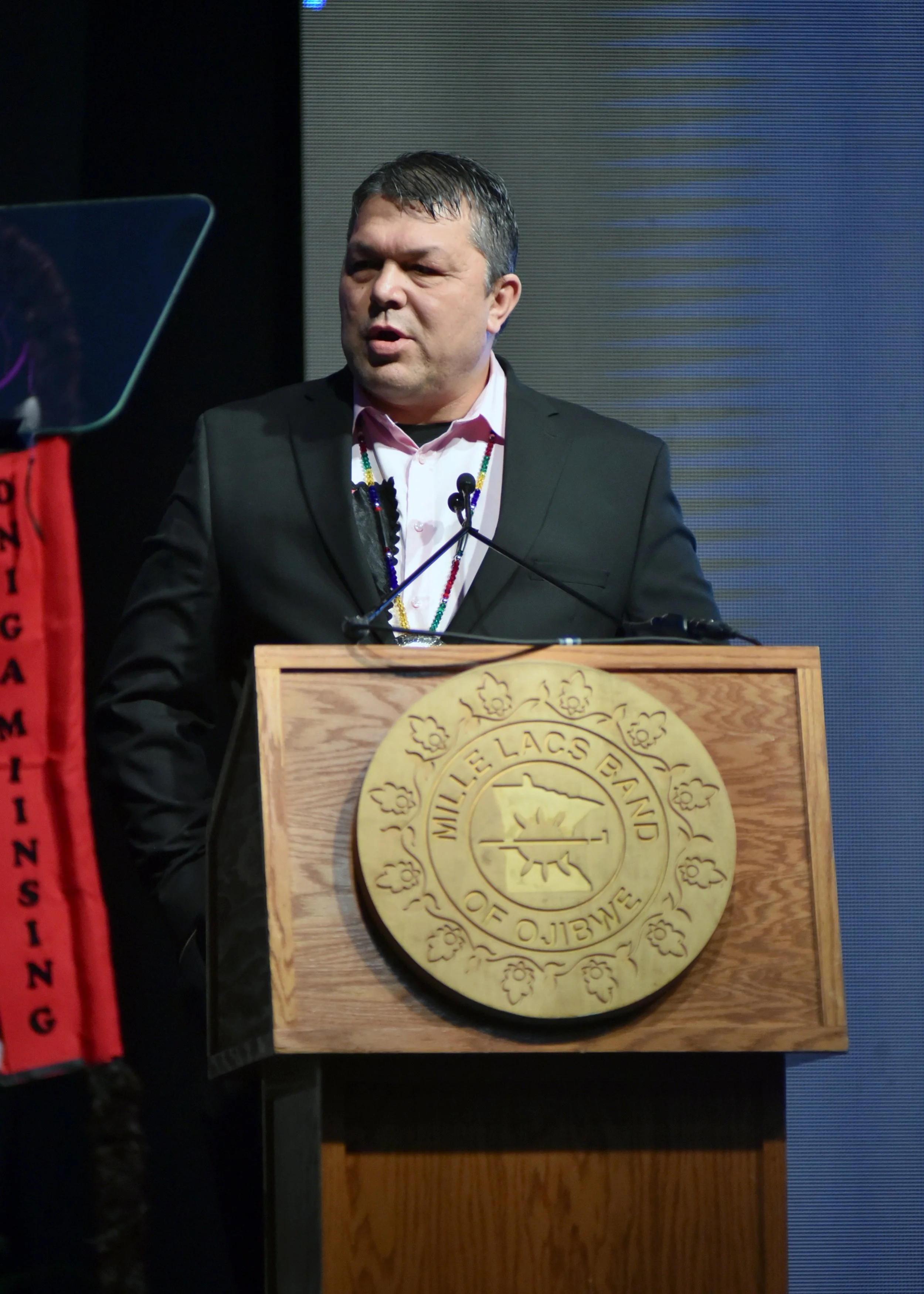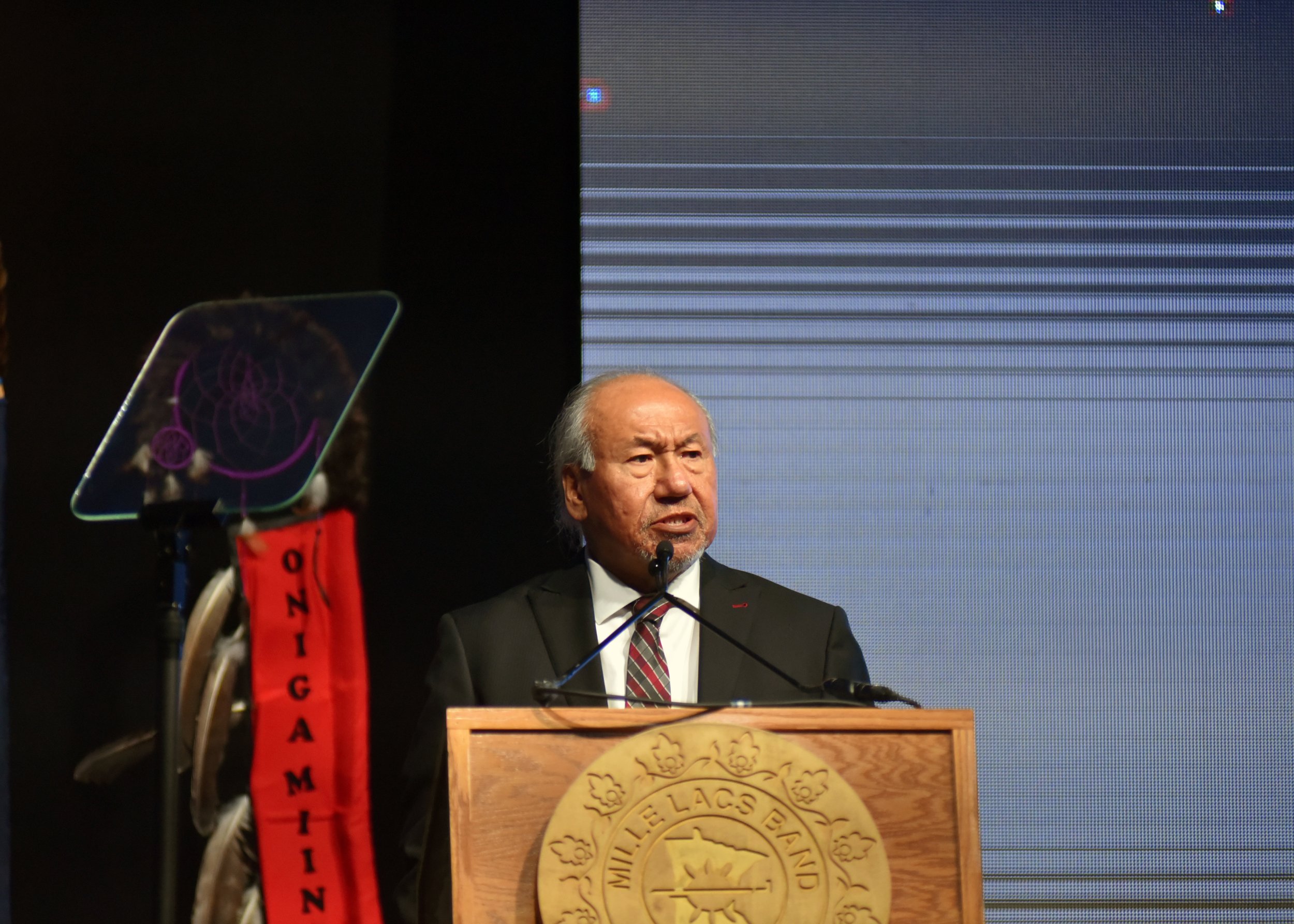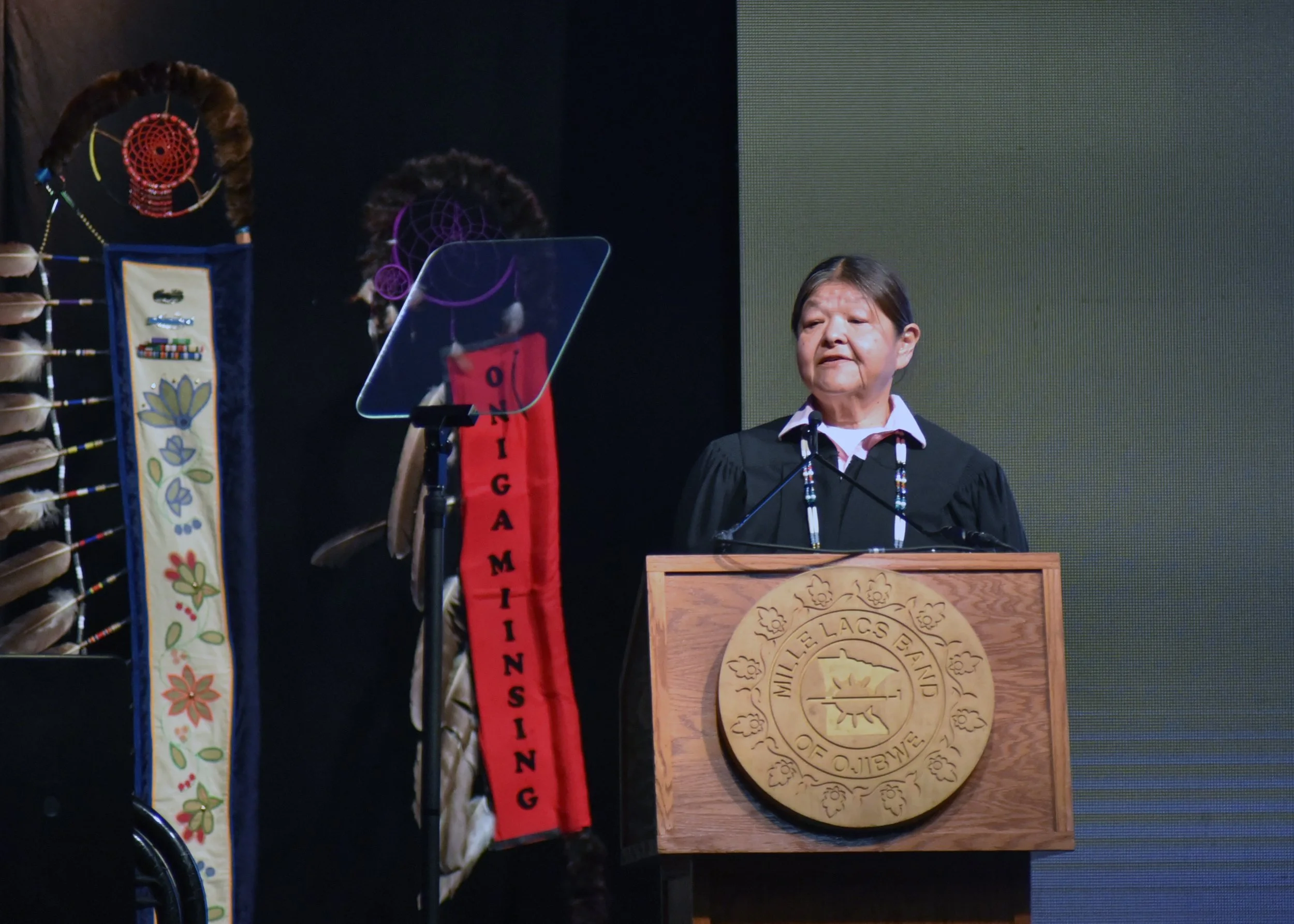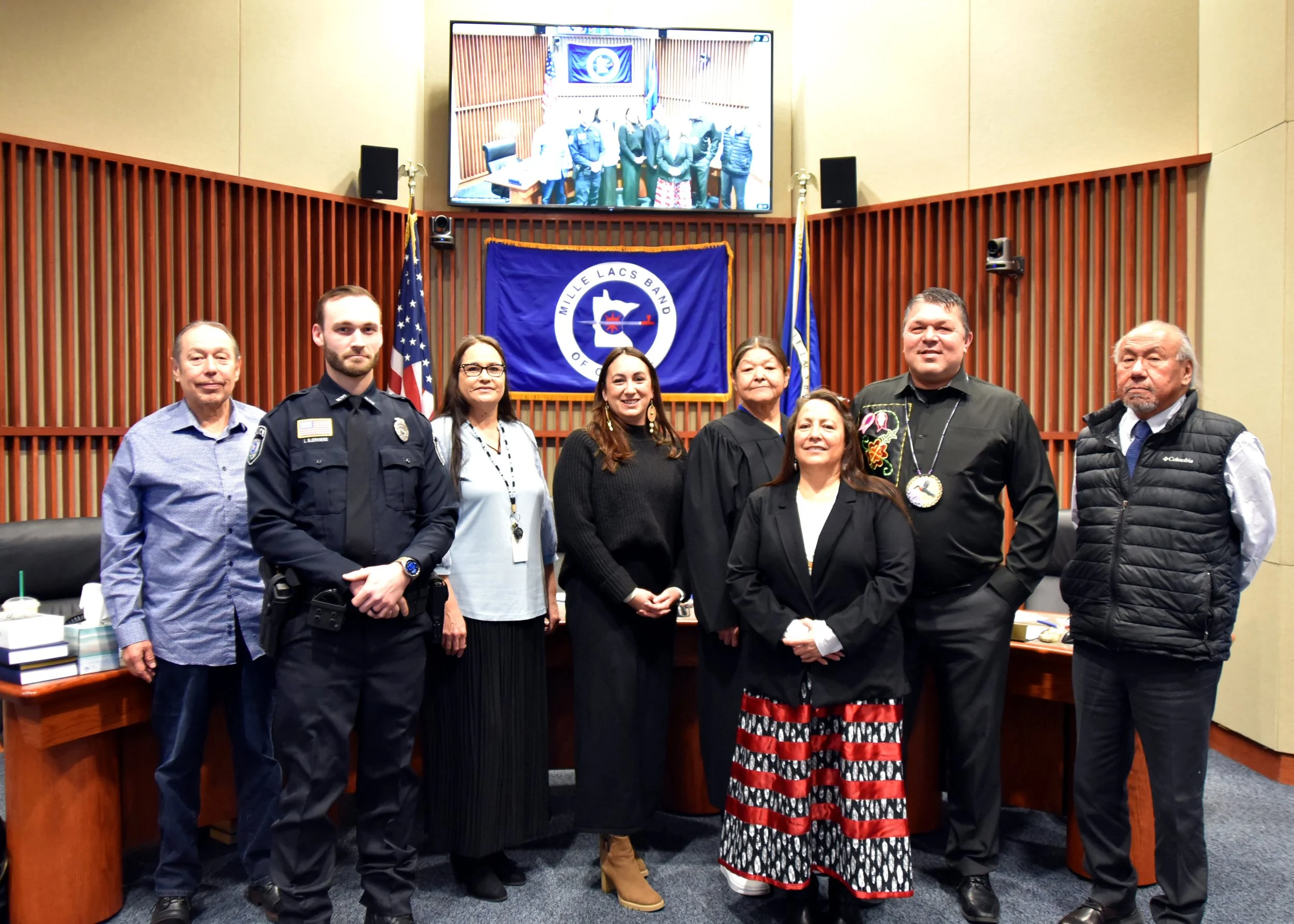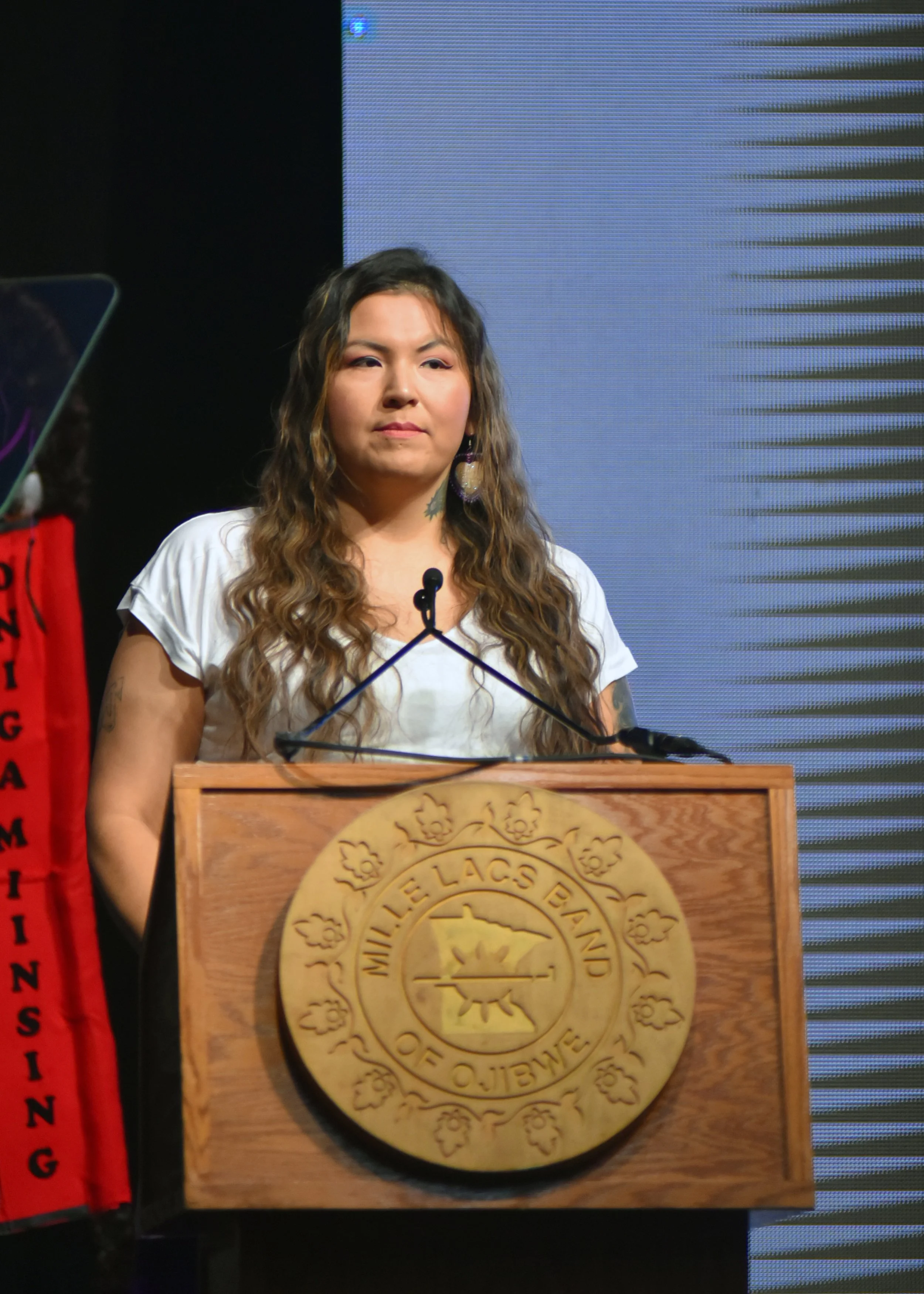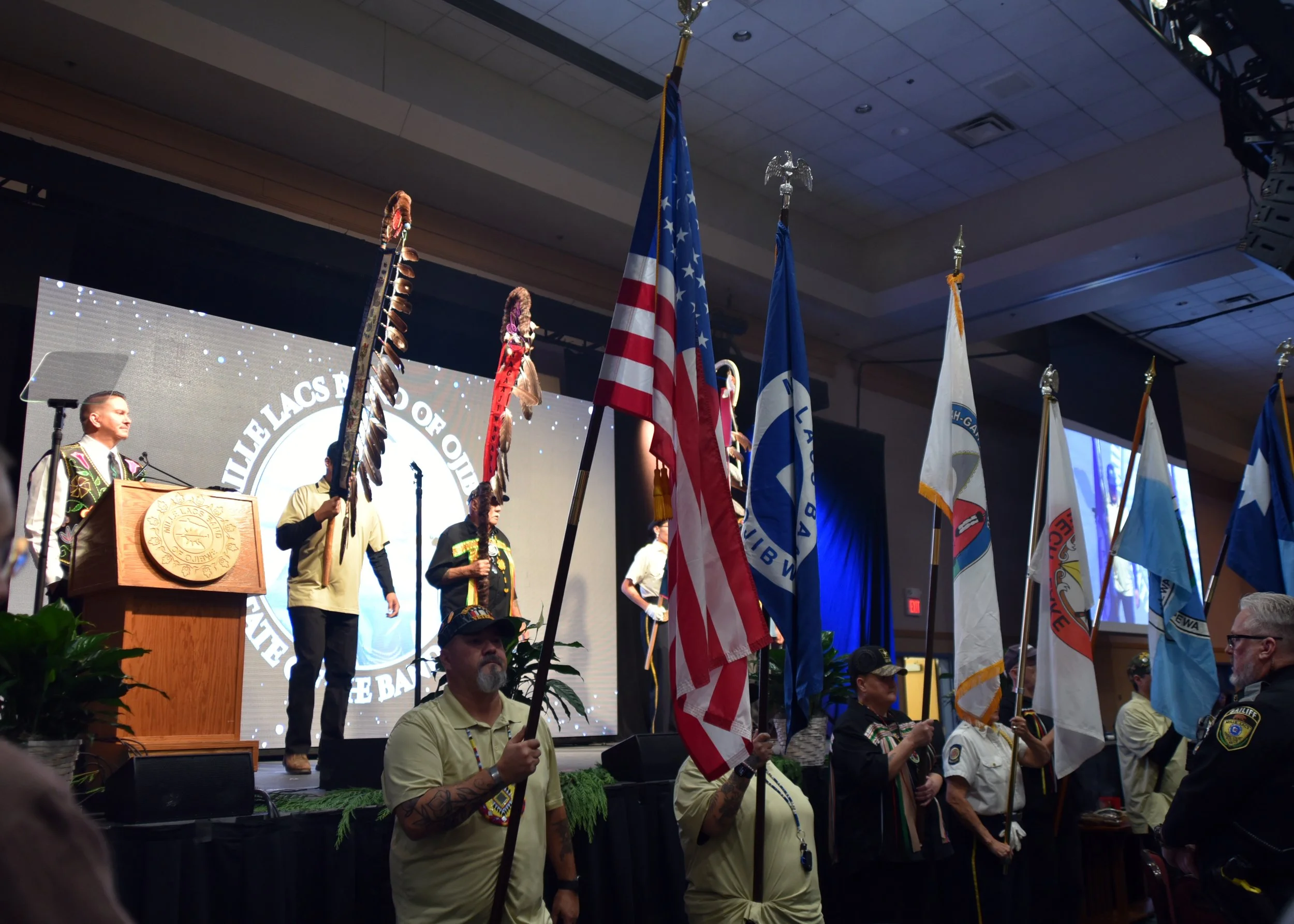
‘Remembering who we are’ state of the band address highlights
In the 42nd Annual State of the Band Address, Chief Executive Virgil Wind centered his message on a guiding truth: as the Mille Lacs Band of Ojibwe faces change and challenge, their "strength comes from remembering who we are as Anishinaabeg and living our values," Chief Executive Wind said.
The Chief Executive began by honoring Elders who passed in recent years, including Marvin Bruneau, Joseph Nayquonabe Sr., Carol Nickaboine, and Lee Staples, and by recognizing District Ill Representative Harry Davis for more than 20 years of service. Their leadership and teachings, he said, continue to guide the Band forward.
Throughout the address, Chief Executive Wind emphasized the Seven Anishinaabe Values - wisdom, love, respect, honesty, humility, bravery, and truth — not as ideals we always meet perfectly, but as principles that help guide decisions, especially in difficult times.
State of the Band Address — chief virgil wind ‘remember who we are’
We are, after all, a Treaty nation. And our Band's Treaties are the Highest Law of the Land. That's why we defend — like ogichidaa in battle — the Rule of Law that secures for us the Treaty rights our ancestors obtained in exchange for valuable resources. The Rule of Law means law enforcement must be lawful. No one is above the law.
I want our membership to know that your leadership is closely monitoring developments and actively working 24/7 to protect the safety and well-being of our people. As a sovereign tribal government, the Mille Lacs Band holds a unique place in America's system of governance. All agencies of the United States government — including ICE — have a trust and treaty obligation to respect our Band's tribal sovereignty and to ensure that the Band and our members are not unduly harassed or harmed by law enforcement activities that have nothing to do with our tribe or tribal law. In this regard, we are redoubling our ongoing efforts to engage on a government-to-government basis in robust consultation with the United States government to insist that any immigration or other law enforcement activity on our Reservation or Band property be done only after consultation with — and the consent of — the Band.
Tribal Government News
State of the band — legislative speaker sheldon boyd
Good morning everyone, travelers, elected officials, honored guests, to the Anishinabe, and to our Indigenous brothers and sisters worldwide, and the cities of Minneapolis-St Paul, Indahnahwaymahgahnahdoog. I have you on my mind this morning.
BAND ASSEMBLY PASSES RESOLUTION OPPOSING ICE ACTIVITY ON MILLE LACS BAND LANDS
On Friday, January 16, 2026, the Mille Lacs Band Assembly passed Resolution 22-01-04-26, formally opposing U.S. Immigration and Customs Enforcement (ICE) activity on Mille Lacs Band lands and requiring federal consultation before any such activity occurs.
The resolution comes in response to several concerning developments, including the increasing presence of ICE officers across Minnesota, the recent shooting death of Renee Good, and reports that four members of the Oglala Sioux Tribe were detained by ICE while in Minnesota. Band leadership is closely monitoring these events and their potential impact on Band members and tribal communities.
RESPONSE TO ICE: BAND SENDS MESSAGE TO SECRETARY OF DEPARTMENT OF HOMELAND SECURITY
Dear Secretary Noem,
On behalf of the Mille Lacs Band of Ojibwe ("the Band"), I am writing as the elected Chief Executive of the Band to express our extreme concer and objection to the recent reports of Immigration and Customs Enforcement (ICE) activity involving the arrest and detention of Tribal members in ongoing operations, and to request government-to-government consultation as to future actions of the ICE agents deployed in Minnesota that may impact our Band members, communities, and properties.
State of the band — Judiciary chief justice rhonda sam
Aaniin and Boozhoo! Honorable Chief Executive and Speaker of the Band Assembly, respected District Representatives, my fellow Mille Lacs Band members, employees and guests. Welcome to the 2026 State of the Band Address. It is my duty to provide you with the State of the Judiciary.
Highlights
GILDA BURR SWORN INTO OFFICE AS NEW COMMISSIONER OF ADMINISTRATION
Lee Bjerkness sworn in as Tribal Police Officer along with MLCV-At-Large Board Member Bernida Humetewa
Tribal PD Officer Lee Bjerkness and Commissioner of Administration Gilda Burr took their oathes of office in Band Assembly chambers on January 21, 2026, sworn in by Chief Justice Rhonda Sam. MLCV At Large board member Bernida Humetewa was sworn in via Zoom. Pictured below are District III Representative Harry Davis, TPD Officer Lee Bjerkness, District I Representative Carolyn Beaulieu, District I Representative Wendy Merrill, Chief Justice Rhonda Sam, Commissioner of Administration Gilda Burr, Chief Executive Virgil Wind, Speaker Sheldon Boyd.
WATER OVER NICKEL: YOUTH AMBASSADOR PROGRAM HIGHLIGHT
At the 2026 State of the Band Address, Mille Lacs Band of Ojibwe Chief Executive Virgil Wind honored the vital work of Water Over Nickel and its Youth Ambassadors, emphasizing the Band's continued leadership in protecting clean water, cultural lifeways, and the future of all Minnesotans.
"Water Over Nickel is the Band's commitment to protect our water, land, and people from the risks of nickel mining," said Chief Executive Wind. "Water connects us to our past, our future, and each other. The proposed Tamarack mine, just a mile from Round Lake and near sacred sites like Rice Lake and Sandy Lake, poses a risk too great to ignore. There has never, ever, ever been a clean nickel mine."
Karri Kegg’s address
Boozhoo everyone. Zhaawanigiizhigookwe indizhinikaaz. My name is Karri Kegg December 3 was such a huge day for me! That's the day I have officially graduated from the Healing to Wellness program. Saying those words out loud felt great. That day I was full of different kinds of emotions because this accomplishment is something I fought for with every piece of me.
STANDING FOR SAFETY, RIGHTS, AND SOVEREIGNTY
The Mille Lacs Band of Ojibwe and its leadership are grieving alongside communities across Minnesota as violence connected to recent ICE activity continues to escalate. The senseless killings of Renee Good and Alex Pretti have shaken the state of Minnesota and around the country, and deepened fear, anger, and uncertainty for many Minnesotans — including Mille Lacs Band members.
MILES OF SMILES AND LOADS OF LAUGHTER
Nayaadamaagejig sponsored a family sliding party held at Kathio State Park on Dec. 30, 2025, and included activities of storytelling, games, and treats.
Indian Country News
US national parks told to remove signs on mistreatment of Native Americans, climate, Wash Post reports:
U.S. officials this month ordered national parks to remove dozens of signs and displays related to the mistreatment of Native Americans by settlers, as well as about climate change and environmental protection, the Washington Post reported. The move is part of President Donald Trump's campaign to reshape public spaces and museums in a way that rights advocates say could undo decades of social progress. The National Park Service staff last week removed an exhibit on slavery from a Philadelphia historic site in line with Trump's claims, rejected by civil rights groups, of "anti-American ideology" at historical and cultural institutions. The removal orders include a display at the Grand Canyon about the forced removal of Native Americans, the Post reported, while at Glacier National Park, Trump administration officials flagged a brochure and a sign about climate change. The U.S. Interior
Department, which oversees the National Park Service, said in a statement that it was carrying out Trump's executive order on "Restoring Truth and Sanity to American History." Source: Reuters.
Wife of accused Minnesota lawmaker killer says husband's actions were "a betrayal"
The wife of Vance Boelter, the man accused in the deadly Minnesota lawmaker shootings, released a statement on Thursday calling her husband's alleged actions "a betrayal." Democratic Minnesota House Speaker Emerita Melissa Hortman and her husband, Mark, were killed inside their Brooklyn Park home in the early morning hours of June 14. Their golden retriever, Gilbert, was also shot and later died from his injuries. Also targeted in the shootings were Democratic state Sen. John Hoffman and his wife, Yvette, who were attacked inside their Champlin home about 90 minutes before the Hortmans were killed. Boelter, 57, faces federal and state murder and attempted murder charges. He was captured some 36 hours after the shootings near his home in Green Isle, about 50 miles southwest of Minneapolis, in what officials say was the largest manhunt in state history. Jenny Boelter's full statement, released on her behalf by her legal team: "On behalf of my children and myself, I want to express our deepest sympathies to the Hortman and Hoffman families. Our condolences are with all who are grieving during this unimaginably difficult time, and we are praying daily for them."
Source: CBS News.
‘As vulnerable as a plant can be’: New study finds climate change largely to blame for less wild rice:
A new study finds the availability of a wild rice in the Great Lakes region has been declining over the past 30 years, partially due to climate change. The decline, the study says, “has disrupted Ojibwe lifeways, family, and health.” Brandon Byrne, inland fisheries biologist at the Great Lakes Indian Fish & Wildlife Commission, or GLIFWC, coauthored and helped collect data for the study. Byrne said that the plant is most vulnerable during its early stages. “Not only is it vulnerable to weather or climatic variables, it’s also vulnerable to motorboat use. Its ecology is very delicate.” Rob Croll, coauthor of the study and commission policy analyst and climate change coordinator, said, “You have to look at manoomin and climate change holistically. It’s as vulnerable a plant as a plant can be. One of the things that we’re seeing — will continue to see — is our precipitation coming less frequently, but more intensely: much heavier rain storms, which can cause quick floods. During [early growth] stages, floods will uproot the plant. Later on in its growth, when there are seeds on the plant, big storms and heavy winds can devastate a rice bed just by blowing the stalks down into the water. Source: WPR Wisconsin Today.
White House budget request slashes funding for tribal colleges and universities:
In President Donald Trump’s budget request, he’s proposing slashing funding for tribal colleges and universities, including eliminating support for the country’s only federally funded college for contemporary Native American arts. If the budget is approved by Congress, beginning in October, the more than $13 million in annual appropriations for the Institute for American Indian Arts in Santa Fe, New Mexico, would be reduced to zero. It would be the first time in nearly 40 years that the congressionally chartered school would not receive federal support, said Robert Martin, the school’s president. Source: APNEWS.

Upcoming EVENTS
April 27
Art Gahbow day
February 16
Chief’s day
March 23

